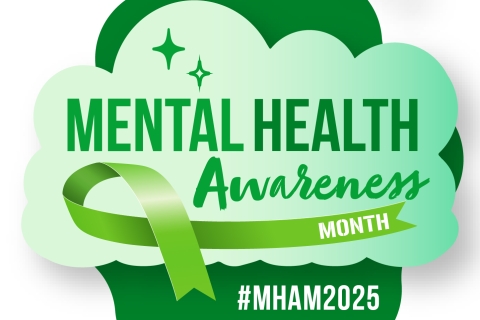Mental Health Awareness Month (May)

Mental illness is no longer seen as something to be ashamed of. Mental health is a condition which affects a person’s thinking, feeling, behavior, or mood. When we are having a mental health concern, it can affect our daily activities. Sometimes, when we have a mental health concern it may cause problems in our relationships with other people. If you think you are having a mental health crisis, the first thing you must know is that you are not alone. Mental health conditions are far more common than people may think. For some people who have a mental illness, they may feel talking about their mental health will cause people to treat them differently. However:
- 1 in 5 U.S. adults experience a mental health crisis each year
- 1 in 20 U.S. adults experience a serious mental health concern each year
- 1 in 6 U.S. youth aged 6-17 experience a mental health disorder each year
- 50% of all lifetime mental conditions begin at age 14, and 75% at age 24
A mental health condition is not the result of one event. There are many variables that can influence whether you develop a mental illness. Variables could include genetics, your environment, and lifestyle. All these factors can influence when and how symptoms develop into a mental illness. A stressful job or home life can cause some people to become more vulnerable than others. Some people may have had trauma in their childhood. Having a biological condition can also play a part in developing a mental health condition.
None of this means that you are broken or that you did something wrong. Mental illness is not your fault. For many people, recovery is a matter of how in touch you are with your thoughts, feelings and behavior. Afterall, it is usually the people who are closest to us that can tell when something is not right.
This month let us all be a little more aware of each other’s difficulty by recognizing early warning signs and when people may need a little help. When we practice good mental health, we seek out meaningful connections with others. We enjoy the benefits of recovery by living a well-balanced life. You can do this by eating the right foods, getting enough rest, and practicing positive choices. This way we are taking care of our mental health.
To learn more about mental health conditions and how they may affect you, contact your local Community Mental Health provider. Click on the link below to read more about mental health conditions and what you can do: https://www.nami.org/about-mental-illness/mental-health-conditions/.
If you feel you need immediate assistance you can give Southwest Michigan Behavioral Health a call at 1-800-890-3712. Clinicians are available Monday through Friday from 8:00am until 5:00pm. If you are calling after hours and need to speak to someone, you can call the Crisis Line by dialing 988 on your phone.


